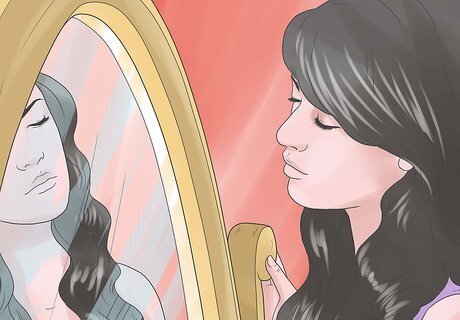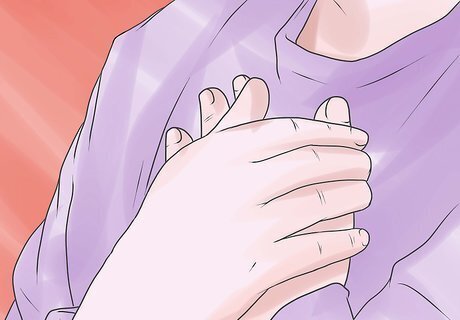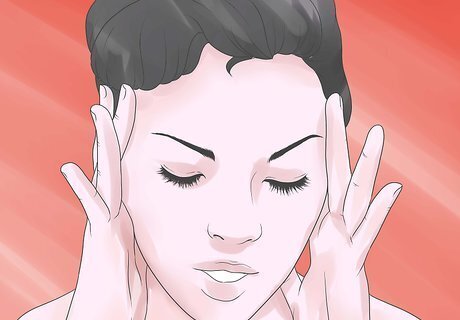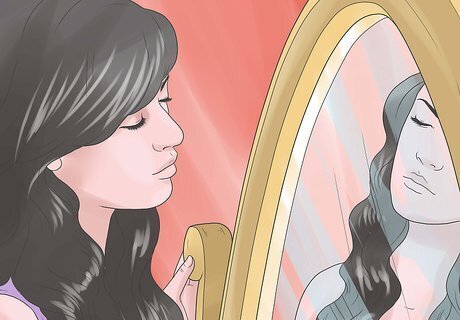
views
Defining Beauty

Understand that true beauty lies within. True beauty is virtuous because true beauty develops out of good character and caring about the world. Before you consider looking virtuous, you need to look internally so that you actually become virtuous. True inner beauty and virtue go hand-in-hand. If you practice the life of a virtuous woman, you will also be a beautiful woman. Your beauty will be authentic, unique and self-expressive rather than conformist.

Let your outward beauty reflect your inward beauty. Maintaining inner beauty does not mean that you cannot look beautiful on the outside, as well. Beauty is harmonious, so if you are beautiful on the inside, you should take care of your body and treat it with enough respect so that others can glimpse your beauty, as well. According to St. Thomas Aquinas, the three characteristics of beauty are radiance, harmony, and wholeness. Beautiful things shine, and their radiance can be seen externally. For beauty to be complete, outward beauty must harmonize with inward beauty. In order for beauty to be whole, it should exist outwardly and inwardly. Your beauty shines in the way you treat yourself, others, and life itself. This does not mean that you need to be supermodel-pretty or hung up on your looks. It does mean that you should not be afraid to look your best. There is a certain amount of self-satisfaction one feels when looking in the mirror and liking what one sees. Loving yourself enough to strive for this sensation is a healthy and virtuous amount of outward beauty.

Do not use your outward beauty to replace or make up for inner beauty. A difficult task for women nowadays is balancing the fine line between looking their best while dressing modestly. A revealing outfit might temporarily attract men, but men of character are won over by women of virtue. While men are responsible for their own thoughts and actions, they are also visual beings and tend to be influenced easily by what they see. Being kind enough and respectful enough to yourself to attract the attention and self-image you want to attract.

Treat your body well. There is a certain amount of virtue in respecting your body and treating it well. Stay healthy by eating healthy foods. Of course, you can be a virtuous woman even if you are not in perfect shape or even if you indulge in the occasional piece of junk food. Respect is a virtue, however, and that includes self-respect. If you respect your body, you should at least try to care for it well enough to stay healthy and avoid exposing your body to things that are intentionally harmful, like drugs or abusive amounts of alcohol. Self-destructive behavior breeds more self-destructive behavior, so be wise enough to prevent it. If you do indulge, remember that the same mind that got you into trouble won't be the one to get you out of it.
Using Other Outward Virtues

Act in service to others. While you should not ignore your own needs, you should think highly of the needs of others and be there to take care of those needs when you can. An obvious example of service would be volunteering your time in a formal situation to help others. Less obvious, however, are informal ways you volunteer your time and energy. For example, a virtuous woman will be there for a friend who needs a shoulder to cry on, even if it means missing out on a favorite show or limited sale.

Be hospitable, generous, and kind. Kindness is about more than nice words and pleasant smiles. To be truly kind to someone, you need to approach that person with a giving spirit. To be kind means that you should be the sort of person whom others can turn to for positive words and actions. It is not enough to simply exchange a few nice words in passing.

Do not falter on your responsibilities. If you are given a task at school or work, finish it in a timely manner and without procrastinating. Another way to look at this principle is to label it as self-discipline. Even if no one is watching and you are able to procrastinate on a task or put less than your best effort into it, you should still do your best with it and complete the task promptly. True virtue is not found merely in the actions that others can see, but in the actions you perform when no one is looking.

Use your money and the earth's resources wisely. You can indulge occasionally, but on the whole, you should not be irresponsible with your money, spend it flippantly, or be wasteful. Frugality is a type of virtue which involves careful stewardship of resources and money. This does not mean that you should be stingy or cheap, though. It does mean that you should take care of your financial obligations before using your money on indulgences. In other words, you should not be spending money on an exotic vacation if it means leaving bills and loans unpaid.

Use your time wisely. Everyone needs time to relax, but overall, you should try to stay active rather than falling into lazy or slothful behavior. In short, you should be a good steward of the time that is allotted you. Take time to relax and recharge as needed, since you can only be at your best when you are sufficiently well-rested. Do not stay active simply for the sake of staying active, though. Be willing to do the work which needs to be done and take care to channel your efforts in ways that will most benefit you and those around you. Be not frivolous with your time.
Realizing Inward Virtue

Have faith. Traditionally, having faith refers to faith in God or some religious principle. If you do not believe in God, however, you can still exercise the principle of faith by being faithful in your pursuit of virtue. A biblical example of a virtuous woman is Ruth, who chose to follow the God of Israel in spite of the difficulty it brought her, when it would have been easier for her to return to Moab and worship the gods of her childhood. This story can teach a valuable lesson even if you do not practice faith in a biblical context. Ruth had committed herself to faith in the God of Israel and was ready to face the consequences, even though backing down would have been easier. You, too, should commit yourself to your faith—in God, or in the goodness of virtue—and remain faithful in spite of the challenges.

Keep your body pure. Another way to phrase this would be to respect your body. Treat your body as a treasure and do not give it away to just anyone. Traditionally, keeping your body pure means waiting until marriage before having sex. Nearly every major religion will agree on this point. Even if you have no religion to claim, the principle of purity still applies to you. Sex should be treated as something special that should only be cherished between two people in love.

Be receptive. Instead of stubbornly sticking to your own opinions regardless of whether they are right or wrong, you should be open to critique and advice. Weigh outside influence carefully to determine if it is beneficial or harmful and act accordingly.

Cultivate reason. Women tend to be very emotional beings, and the downside of emotion is that it can often blind or cripple reason. A virtuous woman accepts her emotions but uses reason to temper her reactions. Govern yourself by wisdom rather than by folly. This is a biblical principle taken from the Book of Proverbs, but it can be applied to your life even if you are not a Christian. You can listen to your heart for guidance, but ultimately, you must judge a situation with your mind, using the wisdom you have built up throughout your life to accurately assess things.
Displaying Virtue in the Home

Respect your parents. Your parents are responsible for bringing you into the world and raising you to become the woman you currently are. To be a virtuous woman, you need to show them respect by adhering to their rules during your youth and by continuing to listen and respect their ideas as an adult. If your parents mistreat you, of course, this is another matter altogether. You need to love yourself as well as your parents, and if the best thing for you is to get away from an abusive situation, doing so is the most virtuous action you can take.

Respect your husband, if applicable. If you are married, you need to love and listen to your husband. Your marriage is a partnership, and your husband is expected to respect you, as well, of course. You do not need to obey your husband's every command, but if you married a man of character, he will not want to do anything to cause you harm. As long as this is true, then you need to at least respect your husband by discussing points of disagreement and considering his perspective before mutually reaching a conclusion. Fidelity is another way for you to respect your husband. You need to be faithful to him, and must never cheat on him.

Be a loving mother, if applicable. If you have children, you must put their needs above your own. Raise them according to a virtuous example and help them to develop into virtuous men and women themselves. You need to nurture your children and attend to their needs, even when it means self-sacrifice on your part. For instance, a virtuous woman and mother will tend to her ill child even if it means catching the bug herself. You also need to discipline your children with care and wisdom so that they know the difference between right and wrong.
Developing Virtue

Orient yourself to the mean, not the extremes. This is a principle first discussed by Aristotle. Too much of a good thing can turn into something bad. Virtue can often be found in the middle ground, between two extremes of a characteristic. For example, take self-love. An extreme excess of this principle will result in narcissism, but an extreme deficiency will produce low self-esteem. You need to love and respect yourself to show love and respect to others, but you need to love yourself in moderation so that you do not get carried away.

Commit yourself to a virtuous life. If you really want to be a virtuous woman, you need to prepare yourself for a lifetime commitment. A virtuous life is not an act you can put on for a few days. True virtue is a lifestyle.

Practice virtue until it becomes habit. You can commit yourself to a virtuous life without becoming a perfectly virtuous woman overnight. The best way to create virtue in yourself is to practice virtuous behaviors so often that they become new habits. Do not be discouraged by past mistakes or mistakes you make along the way. Ultimately, if you practice principles of virtue long enough, they will become habits and characteristics of your overall person.

















Comments
0 comment